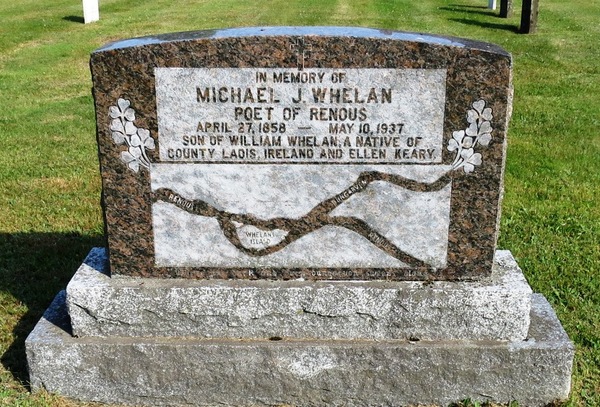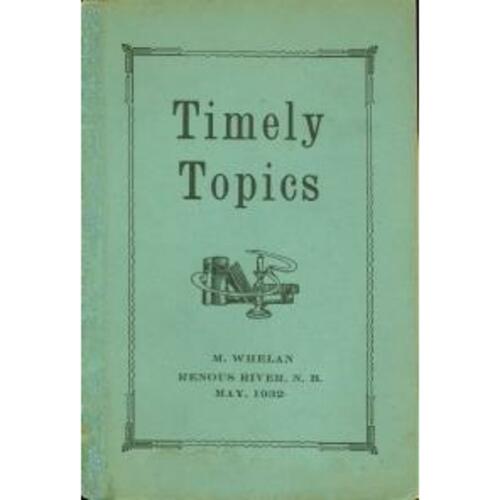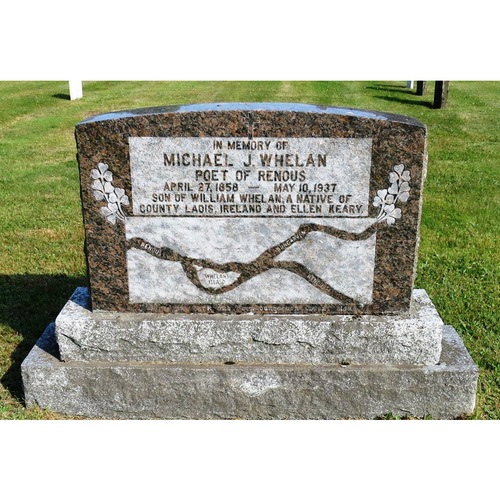
Source: Link
WHELAN, MICHAEL, folk poet; b. 27 April 1858 along the Renous River, N.B., son of William Whelan and Ellen (Mary, Mary Ellen) Keary; d. unmarried 10 May 1937 in Chatham, N.B., and was buried there in St Michael’s Cemetery.
Michael Whelan, the “Bard of Renous,” was the sixth of eight children who grew to adulthood in a humble Irish Roman Catholic home on the Renous, a tributary of the Southwest Miramichi River, in a settlement later known as Grainfield. Michael’s father hailed from Queen’s County (County Laois, Republic of Ireland), and his mother was a native New Brunswicker of Irish descent. Most men in this hardscrabble rural region of the province were woodsmen and subsistence farmers, but Whelan did not fit the mould. After acquiring a public-school education, he taught for a time on a local licence. He later did some bookkeeping for lumber companies, including Jabez Bunting Snowball*’s big firm based in Chatham, and he hired out at times for labourer’s wages.
The only activities Whelan ever showed himself to be passionate about were reading and writing poetry and verse. In the preface to his first book, Poems and songs (1895), he claimed that his work had appeared in newspapers in Montreal, Toronto, Boston, New York, and elsewhere. In fact his main outlet had been the weekly Newcastle Union Advocate. It was the Union Advocate Press that published the 98-page Poems and songs, a collection of previously printed poems. Most of them are formal in diction and serious in tone, and many have religious themes, reflecting Whelan’s devout Catholic faith. For some of his verses he adopts the melodies of popular songs and ballads. There are numerous memorials to persons recently deceased, introspective poems, and verses on local, Canadian, and Irish topics. In “My shamrock,” for example, he reflects on his affection for both Canada and his ancestral homeland:
Although I have not seen it and never hope to see,
The lovely little Emerald that gleams upon the sea,
I love it for my father’s sake, the dear land of his birth,
Next to my native Canada, the dearest spot on earth.
Whelan’s verse continued to appear in newspapers, but 19 years passed before he released a second collection. Queen of the north and other songs and sonnets (1914) has less religious content and is lighter in tone. It includes “The Dungarvon Whooper,” his celebrated narrative about a ghostly voice that haunted the Miramichi woods after a murder at a lumber camp. The story illustrates the Catholic belief that a Christian burial is necessary to ensure the peace of a dead soul [see Noel Lola*]. There are also verses on issues of the day. “Woman – the rose,” for example, includes this stanza:
And if she succeeds as a teacher
And in most other callings of note,
Altho she is barred as a preacher,
Why in thunder not give her the vote?
Between 1916 and 1932 various presses in the Miramichi region turned out 16 small collections of Whelan’s work. The maid of the Miramichi and other poems (1924) has a lengthy entry, “The poets,” which is informative about his literary knowledge, tastes, and influences. The booklet also includes “The cry of labor,” which blames the country’s ruling class for the economic hardships of working people:
Our government locks up the lumber land
That the magnate may rule the sod,
And guardians over the fisheries stand
That were granted us by God;
Our lumber is taken for half its cost
While the merchant profit reaps,
Our farms are mortgaged away and lost,
While the farmer works and weeps.
The great Miramichi fire of 1825 in story and song (1925) has verses about local businessmen that showcase his satirical skills. The last few booklets contain many poems and verses reprinted from his earlier publications, as well as a certain amount of prose.
Whelan’s work is conventional in both substance and form. His core values – faith in Christianity, love of country and community, and respect for the dignity of common life – were those of his readers. They would also have loved the Miramichi localities celebrated in his work and known many of the persons he honoured with poetic tributes. His cultural kinship with his readers made him the unofficial poet laureate of his corner of the province. His 1927 collection Canada: queen of the north, which pays tribute to the 60th anniversary of Confederation, quotes two of New Brunswick’s most famous figures. Businessman Lord Beaverbook [Aitken*] recalls, “I remember your poems very well in the columns of the Union Advocate when I was a boy, and I admired your work greatly,” and future prime minister Richard Bedford Bennett* writes, “For many years I have read your poems and articles in The Chatham World and always with enjoyment.”
Whelan was a slim, athletic figure of striking height. In 1986 a former neighbour, Joe Kehoe, remembered that he stood about 6 feet 7 inches tall and had a “lovely appearance,” with a “superior air” about him. Kehoe recounted a tradition that Whelan had been in love with a woman who met her death at an early age, and that this tragedy marked a turning point in his life. “He never took a drink before she died,” Kehoe stated, “and never stopped after.” In a 1981 address Father Robert Grattan referred to the poet’s addiction to “a drop of the creature,” and stated that at one point several of Whelan’s brothers who were living in Minnesota became concerned about his alcoholism and talked him into moving there, but he returned home after only two years.
In the later decades of his life, Whelan travelled on foot from house to house throughout the Miramichi River valley, selling copies of his publications to anyone who had a few cents to spare. As he aged, his growing infirmities made him an object of sympathy and pity. In his mid seventies, his energies spent, and with no personal resources or family support to call upon, he became an inmate of the county almshouse. He died in Chatham on 10 May 1937, at age 79. The Newcastle North Shore Leader stated that “the deceased gentleman … was famous all over the Miramichi for his poetry, especially extolling the beauties of the Miramichi River and the Renous district.” The Union Advocate observed sadly that Whelan had composed memorial poems for many deceased fellow citizens, but himself had “no one to voice a fitting lament of his departure.” In a passage that was reproduced in the Leader, the Advocate noted: “Life had been a hard struggle for Mr. Whelan for poetic aspirations do not produce much in hard cash and no doubt he had many bitter days, but he was always cheerful and deeply appreciative of those who did him a kindness. He was an extremely well read man, with a real touch of Irish wit and his conversational powers were broad.” Both obituaries delicately avoided mentioning that Whelan died in the poorhouse or that his remains were consigned to an unmarked grave in Chatham’s St Michael’s Cemetery.
In his first published collection, Whelan included a poem he called “My epitaph,” which contains these lines:
My heart has always longed for truth,
I always loved the good and true;
Childhood’s days and my lost youth
Have passed before my saddened view,
And I am not what I would be,
Each passing day and year finds me
Longing to be and do what I should be and do.
The ignominy that befell this gentle, gifted man, who had taken tea in a thousand kitchens and left behind slim volumes of verse that got handed down with the family china, troubled the psyche of succeeding generations in the Miramichi region. In 1981 a citizens’ group erected a granite memorial for him in St Michael’s Cemetery, in 1987 the first scholarly paper on his life and literary career appeared in print, and two years later the Irish Canadian Cultural Association of New Brunswick called attention to his significance, prompting the publication of an edited collection of his work.
Michael Whelan’s “favorite Irish Bard” and “soul’s sweet friend” was Thomas Moore. His star in the firmament may not glow as warmly as Moore’s, but within the Miramichi folk tradition and Irish cultural circles in the province, he enjoys an iconic status as yet unattained by any other folk poet.
Copies of Michael Whelan’s 18 published collections of poetry are scattered among many New Brunswick libraries, none of which has a complete set. In his introduction to Michael Whelan, folk poet of Renous River: a collection of his poetry (Fredericton, 1990), M. O. Nowlan describes some of the difficulties in compiling a comprehensive bibliography of Whelan’s work. The book includes an annotated list in an appendix. Whelan’s publications are: Poems and songs (Newcastle, N.B., 1895); Queen of the north and other songs and sonnets (Newcastle, 1914); Songs of the World War (Renous River, N.B., 1916); The pioneers and other poems ([Newcastle], 1917); The great Miramichi fire, 1825; the polar heroes; and fourteen other poems (Chatham, N.B., 1921); The call of Christ and other poems (Chatham, 1922); “In memoriam”: men and women of Miramichi (Renous River, 1923); The maid of the Miramichi and other poems (Chatham, 1924); The great Miramichi fire of 1825 in story and song, with other poems (n.p., 1925); The sacred silence and other poems (n.p., [1925?]); The garden of God and other poems (Renous River, 1926); Canada: queen of the north: the all-Canadian edition for the 60th anniversary of confederation (Chatham, 1927); The Dungarvon Whooper and other songs of the Miramichi (Renous River, 1928); Some heroes of history (Renous River, 1928); Piracy, prophecy, politics and poetry (Chatham, 1929); The book beautiful (Chatham, 1930); Slogans and other songs ([Renous River, 1930?]); and Timely topics (Renous River, 1932).
The middle initial “J” appears on Whelan’s memorial stone in St Michael’s Cemetery, but other sources and his own works strongly indicate that Whelan did not have a middle name.
Find a Grave, “Memorial no.135417416”: www.findagrave.com (consulted 23 Oct. 2018). Private arch., W. D. Hamilton (Saint John), Interview with Joe Kehoe, Renous River, 27 June 1986. Fred Cogswell, “Collection of folk poetry evokes nostalgia,” Daily Gleaner (Fredericton), 14 Dec. 1990. North Shore Leader (Newcastle), 21 May 1937. Union Advocate (Newcastle), 19 May 1937. “An address by Reverend Robert Grattan – on the occasion of the dedication of a tombstone in honor of Michael J. Whelan, poet of Renous …” (Chatham, n.d.; copy in author’s possession). W. D. Hamilton, Dictionary of Miramichi biography (Saint John, 1997); “Michael Whelan: ‘poet of the Renous,’” in his Miramichi papers (Fredericton, 1987), 61–76.
Cite This Article
W. D. Hamilton, “WHELAN, MICHAEL,” in Dictionary of Canadian Biography, vol. 16, University of Toronto/Université Laval, 2003–, accessed December 16, 2025, https://www.biographi.ca/en/bio/whelan_michael_16E.html.
The citation above shows the format for footnotes and endnotes according to the Chicago manual of style (16th edition). Information to be used in other citation formats:
| Permalink: | https://www.biographi.ca/en/bio/whelan_michael_16E.html |
| Author of Article: | W. D. Hamilton |
| Title of Article: | WHELAN, MICHAEL |
| Publication Name: | Dictionary of Canadian Biography, vol. 16 |
| Publisher: | University of Toronto/Université Laval |
| Year of publication: | 2022 |
| Year of revision: | 2022 |
| Access Date: | December 16, 2025 |




